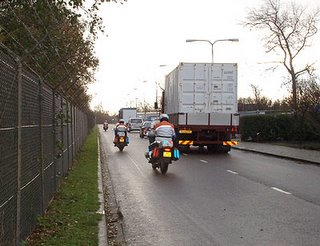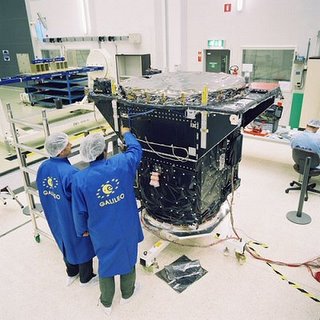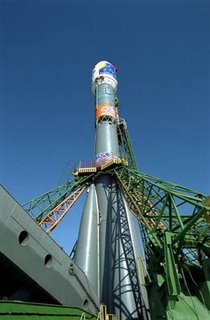 Following on from our reports (here and here) on how the EU's Galileo satellite navigation system was running into trouble, after a dispute over sharing out the development and construction work, the project now seems back on track.
Following on from our reports (here and here) on how the EU's Galileo satellite navigation system was running into trouble, after a dispute over sharing out the development and construction work, the project now seems back on track. According to an AP report, European governments agreed yesterday how they should carve up the jobs and work for the €3.6 billion project, thus ending months of bickering.
The company running Galileo will still be headquartered in Toulouse, France, but Germany's Transport Minister Wolfgang Tiefensee has announced that Germany, the largest sponsor of the project, would host two of Galileo's control centres. German companies European Aeronautic Defence & Space Co., T-Systems, Deutschen Zentrum Luft- und Raumfahrt and Foerderbank Bayern would play a large role in the project through a consortium called TeleOp, he added.
The British, you will all be pleased to know, has been allowed to manage the "administration" from a site in Britain – presumably counting the paper-clips – as its reward for its estimated £400 million contribution to the project.
 The EU is now going full steam ahead plans to launch Galileo's first test satellite in December and the full network is still due to go into service in 2008. The first Galileo satellite must be launched by February 2006 for the EU to retain the frequencies allocated by the International Telecommunications Union.
The EU is now going full steam ahead plans to launch Galileo's first test satellite in December and the full network is still due to go into service in 2008. The first Galileo satellite must be launched by February 2006 for the EU to retain the frequencies allocated by the International Telecommunications Union. However, the full the 25 member states have not yet agreed to cough up with the additional €700 million further financing, the lack of which was stalling the project but, nevertheless, the EU is already pressing ahead with plans for the launch of the first test satellite, as indeed it must.
 Code-named GIOVE A (Galileo In-Orbit Validation Elements), it left the ESA's test facility at the European Space Research and Technology Centre in the Netherlands on the morning of 29 November. It was taken by road from the European Space Research and Technology Centre (ESTEC) to Amsterdam’s Schiphol airport, where it was loaded onto an Antonov transport plane, destined for the Baikonur Cosmodrome in Kazakhstan, where it will be launched by a Soyuz rocket later this month.
Code-named GIOVE A (Galileo In-Orbit Validation Elements), it left the ESA's test facility at the European Space Research and Technology Centre in the Netherlands on the morning of 29 November. It was taken by road from the European Space Research and Technology Centre (ESTEC) to Amsterdam’s Schiphol airport, where it was loaded onto an Antonov transport plane, destined for the Baikonur Cosmodrome in Kazakhstan, where it will be launched by a Soyuz rocket later this month.Meanwhile, no doubt with an eye to the profitable military equipment sales to China that it expects to emerge from a successful deployment of Galileo, the French today renewed their calls for the EU to drop its arms embargo on China, again describing the ban as an anachronism, this time during a visit by Premier Wen Jiabao. "We will continue to work for it to be lifted," says prime minister Dominique de Villepin.
COMMENT THREAD
No comments:
Post a Comment
Note: only a member of this blog may post a comment.